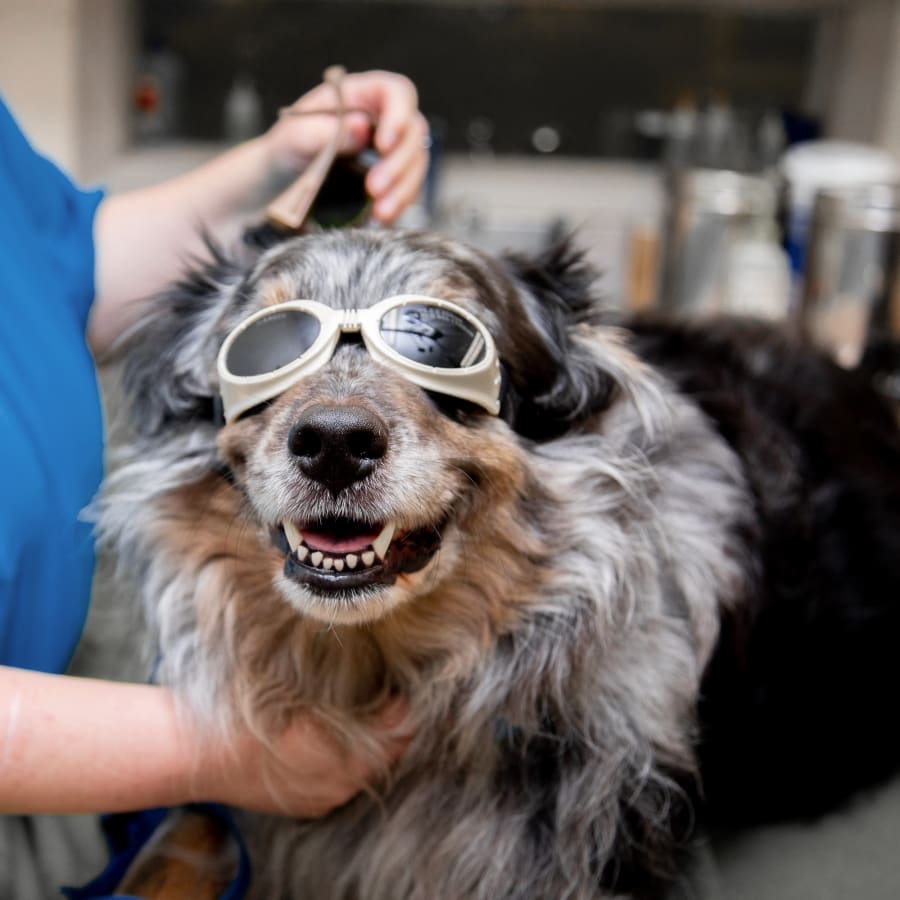What is Low Level Vet Laser Therapy?
During a Low Level Laser Therapy (LLLT) session, our veterinary laser therapists use a low-intensity laser or light-emitting diode (LED) to help relieve pain, stimulate and enhance cell function, and treat wounds and various chronic health issues.
Several conditions have been shown to improve with the use of this non-invasive treatment option, including musculoskeletal problems, spinal cord injuries, pancreatitis and arthritis symptoms.

Uses for Veterinary Laser Therapy
Vet Laser therapy supports the repair of damaged cells and helps to nourish damaged tissue, benefiting the following conditions and procedures:
- Wounds
- Cancer
- Strains & Sprains
- Chronic Liver Disease
- Gum Disease
- Inflammation
- Arthritis
- Ulcers
- Inflammatory Bowel Disease
- Cystitis
Vet Laser Therapy FAQ
Learn more about Low Level Laser Therapy at Ruckersville Animal Hospital by reviewing frequently asked questions we've received from pet owners about this service.
- What are the benefits for my pet?
Low-level laser therapy offers many benefits for cats & dogs with acute and chronic health conditions from gum disease and spinal cord injuries to corneal ulcers and even cancer.
Specifically, this type of laser therapy:
- Increases healing of wounds and fractures
- Unclogs mitochondria of diseased or injured cells
- Reduces inflammation and associated pain
- Dilation of lymphatics and blood vessels
- Increases blood perfusion
- Reduces edema (swelling)
- Encourages bone healing
- How does Low Level Laser Therapy work?
Low Level Laser Therapy is another term for photobiomodulation therapy (PBMT).
In the past, therapeutic lasers were often referred to as low-level or cold laser therapy (as opposed to hot lasers which were used in veterinary surgeries).
Light is used at very specific frequencies to trigger a physiological change at the cellular level.
These changes may include restocking adenosine triphosphate (ATP) and NADH, the energy molecules that fuel cells, giving them a "jump start" needed to support healing and other processes within the body.
- What happens during treatment?
At Ruckersville Animal Hospital, we have eight different lasers ranging from a 50mW red laser to a 3000mW infrared laser. This enables us to tailor to each treatment to optimal effect for a particular disease.
During a typical veterinary low-level laser therapy or cold laser therapy treatment, dogs or cats will lie on a blanket or padded bed on a table or floor. Treatment is delivered using a handheld laser while an animal reclines.
Both the pet and anyone in the room must wear goggles to protect their eyes while the laser is being used.
- Are there any side effects?
Low Level Laser Therapy (previously also known as veterinary cold laser therapy) does not affect normal tissue at the doses and wavelengths being used for this treatment.
Higher powered lasers can burn skin and denature protein if left in one place for too long.
Also, lasers can damage the retina of the eye if left in place for a prolonged time. Your pet should not suffer from any harmful side effects as a result of treatments performed by our laser therapists at Ruckersville Animal Hospital.
New Patients Welcome
We always look forward to welcoming new patients. Our experienced vets are passionate about the health of companion animals in Ruckersville. Get in touch today to book your pet's first appointment.
Contact
Hours
-
Click to View
- Monday:08:00 am - 06:00 pm
- Tuesday:07:00 am - 06:00 pm
- Wednesday:07:00 am - 06:00 pm
- Thursday:07:00 am - 06:00 pm
- Friday:07:00 am - 06:00 pm
- Saturday:Closed
- Sunday:Closed
